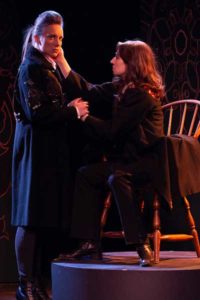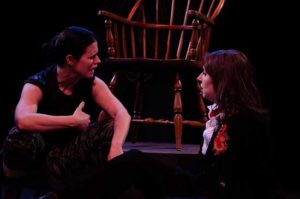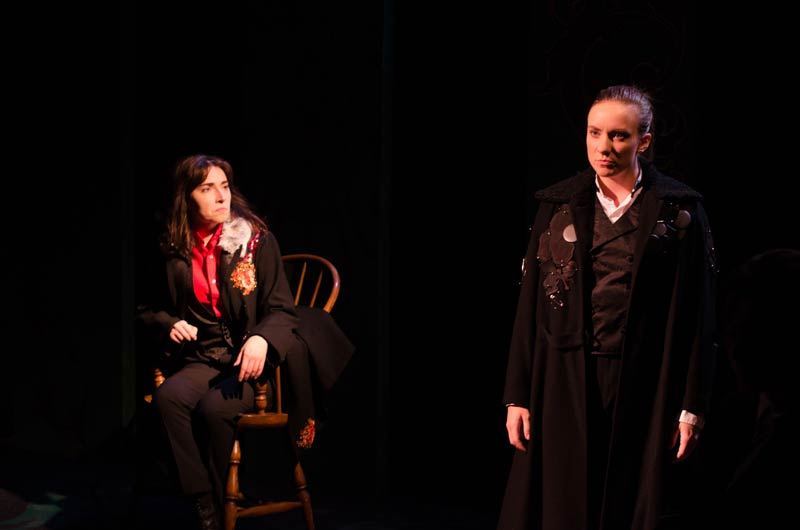
Gross Indecency: The Three Trials of Oscar Wilde, by Moises Kaufman. Set by Jeremiah Barr. Lighting by Charles Blunt. Costumes by Uriel Gomez. Photo by Tom McGrath; TCMcG Photography
Promethean Theatre Ensemble has breathed new life into Gross Indecency: telling the story of a man oppressed and abused for being himself, while simultaneously reviving the notion of art as free from the strictures of morality. This is a fascinating juxtaposition for the contemporary Chicago arts scene: virtually everyone would side unequivocally with Wilde on the first point, while the latter might (and should) cause serious hesitation from anyone who has considered critical lenses or the messaging of a piece of art.
[tl;dr: Promethean’s Gross Indecency is one of the best productions I have seen in at least a few years. Jamie Bragg’s Wilde is playful and subtle, perhaps even too subtle for the moderately-sized space, yet endearing and emotionally affecting. Kevin Sheehan’s clear and pronounced gests as Sir Edward Clark help drive the show, especially in its first third. Although strong and occasionally outstanding performances abound, it is unquestionably director Brian Pastor’s staging that carries this show, aided greatly by Lyndsay Kane’s movement coordination. Uriel Gomez’ costumes beautify and unify, helping to strengthen the ensemble nature of a show that might otherwise focus too much on its title character. The set, though by no means revolutionary, provides a focal point on Wilde while also empowering the debating parties. This show moved me to tears more than once, reminding me of the power of art for art’s sake and how both our deepest passions and most shameful compromises can ultimately come to naught, and left me newly invigorated to invest in my own art. This was a theatrical triumph I strongly recommend. You can read my other reviews here.]
THE PRODUCTION
It may come as little surprise that in an ensemble show and docudrama, the staging tends to steal the spotlight. Performances are solid and occasionally striking, but it is director Brian Pastor’s decisions to put who where, when, that create the biggest impact. Pastor wisely gets Oscar Wilde (played subtly and endearingly by Jamie Bragg) out of his chair often, enlivening his ironically armchair-esque philosophies by drawing the eye and occasionally mechanizing the normally extremely romantic artiste. The division of roles also kept most potential breaks-in-the-mood earlier in the show: the biggest out-of-the-moment moment was (perhaps inevitably) the strongly accented George Bernard Shaw (played by a natural and engaging Brendan Hutt), while characters introduced later were kept much subtler in their characterization. This seems like a good time to point out that the accents, thanks to dialect coach Catherine Gillespie, were uniformly fluid, cogent, and (most importantly) coherent. This is also a good time to forewarn you that the word “subtle” is going to come up a lot. I lost my thesaurus.

Heather Kae Smith as Lord Alfred “Bosie” Douglas, Jamie Bragg as Oscar Wilde. Photo by Tom McGrath; TCMcG Photography
This isn’t to say, however, that the performances were nothing to write home about. Bragg’s Wilde is every bit as charming, disarming, and occasionally alarming as one would demand from such a figure. Like Wilde, Bragg is subtle, letting the force of other actors wash off her with an amusing and comforting effect, making it all the more jarring when these charms suddenly fail. There were times when Bragg seemed almost too subtle for the moderately-sized space, if not for a docudrama generally, but relative subtlety was found throughout the show; so if this is a fault, it is Pastor’s, not Bragg’s. And one could easily argue that the bombastic, archetypical characters one often sees in docudramas are more at home in classroom Brecht than city-side Kaufman. Bragg’s natural humor, even at the most dire and self-effacing moments, provide an emotional arc for the performance and ground us inescapably on Wilde’s side; clearly the script’s intention. Occasional breaks into more mechanized movement serve to highlight both acts of dishonesty and pronouncements of historical impact, and are achieved fluidly without the self-conscious size of more typical Brechtian gest.
Sir Edward Clarke, Wilde’s lawyer, is the driving force in the first third of this play, and Kevin Sheehan is well cast in this role. His clarity and elocution (thanks again to Catherine Gillespie) and precision of movement (Movement coordinator: Lyndsay Kane) maintain our interest for the info-dump Clarke provides early on. Jared Dennis is equally forceful as the Marquess of Queensberry, which he contrasts clearly yet softly with his later portrayal of Charles Gill (Lockwood is inevitably eclipsed by these two giants, but Dennis manages to demarcate him effectively as well). Brendan Hutt is a delightful addition to this ensemble: his broader characters like George Bernard Shaw and Alfred Wood are the largest we see (without disrupting the overall fluidity of the show), while his direct-address and embodiment of Kaufman are among the most engagingly natural.

Kat Evens as Frank Harris; Jamie Bragg as Oscar Wilde. Photo by Tom McGrath, TCMcG Photography
Uriel Gomez’ costumes beautify and unify the cast. The Victorian-punk blend puts the show, unsurprisingly, on Wilde’s side, again reminding me of how differently we view the morality of art nowadays. Of course, punk and Oscar Wilde are hardly a one-to-one comparison, but then Wilde himself seemed disinterested in obtuse allegory. More than anything, a design evocative of the punk aesthetic primes us for an anti-establishment mindset, which surely is something of which Wilde would approve (whilst remaining thoroughly apolitical himself, naturally). This again primes us to sympathize with Wilde (assuming that’s necessary), which seems very in-line with the script’s intent.
Jeremiah Burr’s set is simple and effective, my favorite kind. It is by no means unique for a production of Gross Indecency, but why should it be? The usual focal point on Wilde is maintained, creating a focus on the title character that contrasts beautifully with the costume design’s more egalitarian statement. By placing the lawyers’ benches on small platforms, it also lends additional strength to the two argumentative forces that are central to this debate-driven play.
For all my shrugging at the subtlety of this show, there’s no question that Promethean’s Gross Indecency produced an emotional effect I have not experienced before in a docudrama or epic theatre piece. We can debate the ‘purity’ of character arcs and emotional catharses in such works, but I have been moved to consider the philosophical issues raised by this play in more detail than after any similar piece I have yet seen. Is art exempt from external morality? Is art’s message paramount? Who decides, both the message and its importance? For that matter, who decides what is beautiful? The fact that a docudrama of all things can make me pine for Art for Art’s Sake is an impressive accomplishment, and the relative subtlety of Promethean’s staging and performances are a strong part of that effect.
Promethean’s Gross Indecency was an outstanding production that I’d recommend to anyone.
THE THING ITSELF
“It is absurd to divide people into good and bad. People are either charming or tedious.” – Lady Windermere’s Fan
The above quote is not mentioned in Moises Kaufman’s Gross Indecency: the Three Trials of Oscar Wilde, but it is the first thing that comes to my mind whenever the legendary writer and socialite is mentioned. Based on his other quotes about good and evil, I am inclined to believe that Wilde saw this maxim and those like it as a liberating form of enlightenment. Most charming people do, I suppose. I always saw it as the final nail in humanity’s coffin. That isn’t to say that I think it’s inaccurate; just supremely depressing.
However, Gross Indecency‘s Wilde is less concerned with the morality of people, and far more concerned with the morality of art (in that, according to him, there is none); and the inherent virtue of beauty. These struck me as odd sentiments for contemporary Chicago, where a play’s message is frequently expected to overshadow all other elements, where the morality of a play is both a prerequisite and a primary selling point. In this light, it might seem at first glance that Promethean’s Gross Indecency is casting us as the stuffily oppressive and hypocritical Victorians: demanding that art ascribe to moral litmus tests before being considered on any other merits. Perhaps that’s why additional efforts were made to have us sympathize with Wilde: so we might more strongly consider art’s independence from morality.
Of course, the morality promoted by Chicago’s contemporary theater scene is very different than that of Victorian England. Privileged Chicago artists may be, but you are unlikely to find them residing on the Gold Coast. Nor are they enacting legislation or greasing the palms of those who do. Most importantly, while Victorian morality focused on the rigid adherence to strictly narrow gender roles and sexual prudishness (at least publicly), contemporary leftism and liberalism are more concerned with the equality of sex, gender, and numerous other facets of identity that did not even exist in the public or perhaps even private consciousness in Wilde’s time and place. Marvin Taylor, as quoted in the play, points out that the idea of being defined by one’s attraction to the same sex did not exist in Victorian England. Most if not all of the people reading this probably do not have to work hard to imagine what it might be like: not fully understanding who and what you are because the words simply did not exist.
On the other hand, Kierkegaard famously said “When you label me, you negate me,” and Wilde seems to pretty firmly hold this view. Taylor is also quoted in support of this point: that LGBTQ+ folks might be disappointed when looking to make Wilde an icon, in that he eschewed most labels. He used his first trial, not to promote the liberation or equality of any group of people, but to promote his own views on aestheticism.
So does art have a moral imperative? Chicago art clearly has a fairly restrictive moral code, but that code consists of such rules as “punch up,” “treat people equally,” “judge folks on their actions and not their identity.” It’s hard to indict those rules, even if you hate rules, as a rule. Likewise, it’s literally hard to indict other rules like “work hard and you’ll succeed,” or “material success is a sign of artistic worth,” without brushing up against those first, more egalitarian rules; not least of all because many artists use those egalitarian rules as a marketing device to achieve their success.
Complicating matters further: did Oscar Wilde truly believe that art is separate from morality, or did he only believe that because the morality of his time was so thoroughly fascistic? It’s like Orwell: if the only word for ‘freedom’ is ‘badthought,’ then you’re never going to have a nuanced conversation about freedom. Did Wilde eschew labels because of a sincere desire not to be pinned down, or because the labels associated with his identity included such terms as “gross indecency?”
“In later years, Wilde turned against Douglas, blaming him for his imprisonment,” the play tells us, rather late in the game. This isn’t the end of the story, but it was the most impactful moment for me. Whether by design or happenstance, Promethean’s promotions made much of the relationship between Wilde and Douglas, letting the production’s views on aestheticism (and morality in art) take a back seat. The script’s text strongly suggests that Wilde undertook this case, not to defend himself or even to aid Douglas, but to promote his artistic views. On the other hand, it was still dangerous, and Douglas was certainly pushing him to do it. Such sacrifice was made, then, and seemingly all for nothing. Wilde championed not only the appreciation of beauty, but the mad pursuit of it. But he also wrote The Picture of Dorian Gray and The Ballad of Reading Gaol. But he also lived in a world that would demand the ostensibly moralistic conclusions these works present. But he also lived to defy the demands of the world. But defying the world still necessarily means defining yourself via someone else’s standards. But if everyone must necessarily define themselves in response to others, is it even possible to avoid labeling oneself for the convenience of the world? Maybe we are meant to resist the inevitable negation of labels, just as by living we resist the inevitability of death. Maybe. I don’t know. I do know that dominant ideologies will inevitably demand conformity from divergent ideologies, whatever they are. The moral thing seems to be resisting conformity as much as one can without harming those weaker than yourself. I don’t know if that’s possible.

Jamie Bragg as Oscar Wilde; Heather Kae Smith as Lord Alfred “Bosie” Douglas. Photo by Tom McGrath, TCMcG Photography
